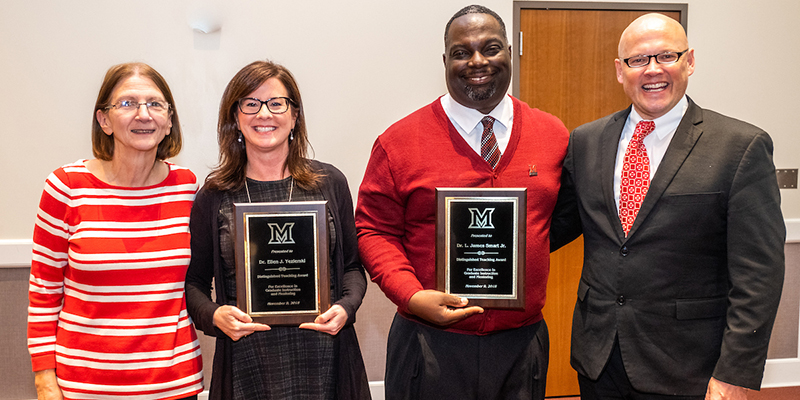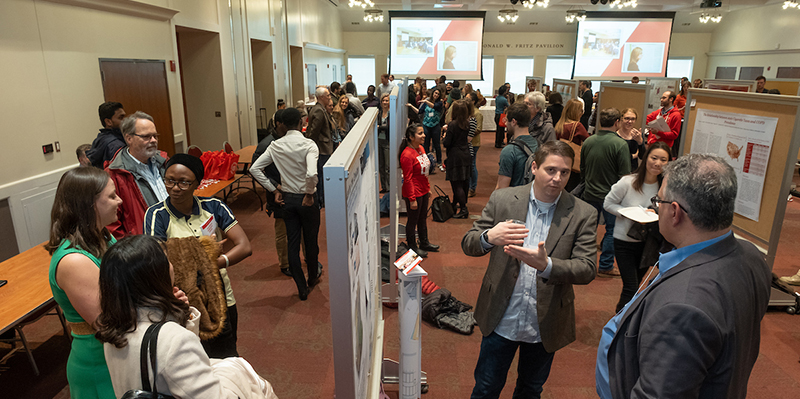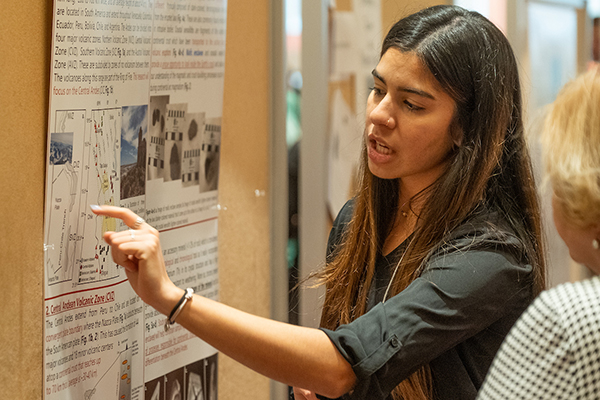

Ellen Yezierski and Jay Smart receive mentor awards

Ellen Yezierski and Jay Smart receive congratulations from Provost Phyllis Callahan and President Gregory Crawford.
By Brady Easterling, university news and communications intern
Ellen Yezierski and Jay Smart each received recognition for their mentor work with students
The Distinguished Teaching Award for Excellence in Graduate Instruction and Mentoring honors faculty who have served at least seven years with an appointment in a graduate and/or professional degree-granting department.
Rose Marie Ward, associate dean of Miami’s graduate school, said of the two award recipients, “Both
Ward said that Yezierski and Smart connect students with professionals in their field and find ways to apply knowledge.
Ellen Yezierski encourages students to strategize
Yezierski is a professor of chemistry and director of the Center for Teaching Excellence, which seeks to improve learning and promote the scholarship of teaching and learning among faculty. She’s working to improve how chemistry is taught and how students conceptualize it.
She said that her responsibility as a teacher is to design supportive environments and personalized experiences that enable students to construct their own knowledge.
She added, “As their coach, I sometimes have to tell them which strategies to use; however, my approach is to scaffold their learning such that they eventually develop their own strategies.”
The Yezierski Research Group is made up of undergraduates and graduate students who study how chemistry is taught across middle school, high school and college levels. Their work explores developments in areas like scientific reasoning and best practices for scientific instruction, totaling 45 published works.
Jay Smart gives students the tools to create their own paths
Like Yezierski, Smart has committed much of his career to
Smart considers his teaching approach to be an apprentice model. He gives students intellectual and methodological tools to generate their own ideas and perspectives.
Smart said, “I’m not interested in making clones of myself. I really enjoy seeing students at all levels taking what I have given them and creating a path for themselves and doing well. Then I know I am doing my job.”
His research examines the relationships between human perception and action, studying things like coordination and motion sickness. He also teaches several psychology courses with various focuses, like perception, cognition, motor control and the psychology of design, to list a few.
The Graduate Research Forum was founded 10 years ago.
Graduate Research Forum founders honored
Bruce Cochrane, professor emeritus of the biology department, and Ann Frymier, professor of communication in the department of media, journalism
There were 150 graduate students presenting their research to more than 50 alumni judges. The forum is an opportunity for graduate students to share their findings and earn awards or grants.

